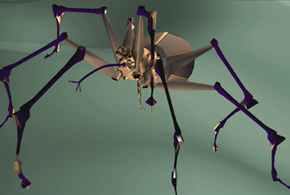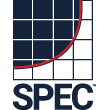|
SPECapc for 3ds Max™ 2011 is performance evaluation software for systems running Autodesk 3ds Max 2011. It is available as a Professional Version and a Personal Version.
The Professional Version of SPECapc for 3ds Max 2011, available for $495 on this website, contains 58 tests for comprehensive measurement of modeling, interactive graphics, CPU and GPU performance. It includes a 32-million-polygon city scene that is modeled, rendered and displayed in real time, testing the limits of high-end workstations with powerful CPU/GPU combinations.
Licensees of the Professional Version of SPECapc for 3ds Max 2011 can publish benchmark results publicly and submit them for review and possible publication on the SPEC website.
The Personal Version of SPECapc for 3ds Max 2011 is available for $20 on this website. It is an easy-to-use benchmark that generates a single number from a subset of tests in the Professional Version. The Personal Version is designed for those seeking more information about 3ds Max 2011 performance, but who don’t have the need for a comprehensive test suite using large models and do not wish to publish test results.
New features in SPECapc for 3ds Max 2011 include:
- Updated tests based on new functionality in 3ds Max 2011.
- An improved user interface that makes it easier to configure and run tests.
- Increased level of testing for shading and rendering in the Professional Version, including use of the Autodesk Quicksilver engine for accelerated CPU and GPU rendering.
- Automated benchmark results compilation in the Professional Version.
A single score is reported for the Personal Version. Results for the Professional Version are derived by taking the total number of seconds to run each test and nomalizing it based
on a reference machine, in this case a Dell Precision 690 workstation with 2.0-GHz Intel Xeon 5130 processor, 4 x 4GB FB-DIMM DDR2 SDRAM (ECC) memory, NVIDIA Quadra FX 570 graphics card, and 80GB Seagate 7200RPM hard drive. The normalization process
ensures a scoring system where a bigger score is better. Composite
scores for the Professional Version are reported for CPU, GPU and large-model (city scene) performance.
Recommended memory is 16GB for the Professional Version and 8GB for the Personal Version. The Professional Version is supported only on systems running the Microsoft Windows Win7 64-bit operating system. The Personal Version is unsupported, but it is recommended for Win7 32-bit and 64-bit.
Below is a list of tests contained in SPECapc for 3ds Max 2011. Those designated with a "1" in the center column are exclusive to the Professional Version.
Large Model CPU |
1 |
Test0020 |
Building City |
Large Model GPU |
1 |
Test0030 |
Moving City |
Interactive Graphics |
1 |
Test0040 |
Building Flyby |
Modeling |
1 |
Test0041 |
Gizmo Transforms - Move |
Modeling |
1 |
Test0042 |
Gizmo Transforms - Rotate |
Modeling |
1 |
Test0043 |
Gizmo Transforms - Scale |
Modeling |
0 |
Test0050 |
Changing Color Test |
Modeling |
0 |
Test0070 |
SubObject Vertices |
Modeling |
0 |
Test0080 |
SubObject Edges |
Modeling |
0 |
Test0090 |
SubObject Faces |
Modeling |
0 |
Test0100 |
Extrude Faces |
Modeling |
0 |
Test0110 |
Bevel Faces |
Modeling |
0 |
Test0121 |
Vertex Soft-Selection |
CPU Computing |
0 |
Test0125 |
Create Textures |
Modeling |
0 |
Test0130 |
Multi-SubObject Texturing |
Interactive Graphics |
0 |
Test0140 |
Moving Blended Lights |
Modeling |
0 |
Test0171 |
Modify Objects - Short |
Modeling |
0 |
Test0210 |
Softbody Objects - Flag |
Interactive Graphics |
0 |
Test0220 |
Sphere Array - Wireframe |
Interactive Graphics |
0 |
Test0320 |
Xray Objects - Sphere Array |
Interactive Graphics |
0 |
Test0323 |
Opacity Performance - Blended |
Interactive Graphics |
0 |
Test0340 |
IK Group |
Modeling |
0 |
Test0370 |
Create Tank Scene |
Interactive Graphics |
0 |
Test0390 |
Particle Tests |
Interactive Graphics |
0 |
Test0400 |
Max Hardware Light Test |
Interactive Graphics |
1 |
Test0410 |
Brutal Flower - Multiple Object Stress |
Interactive Graphics |
0 |
Test0531 |
UnderWater Animation |
Interactive Graphics |
0 |
Test0541 |
Architecture Wireframe |
Interactive Graphics |
0 |
Test0561 |
Train Wireframe |
Interactive Graphics |
0 |
Test0562 |
Train Smooth with Edges |
Interactive Graphics |
0 |
Test0600 |
SpaceFlyby Wireframe |
Interactive Graphics |
0 |
Test0601 |
SpaceFlyby Smooth with Edges |
Interactive Graphics |
0 |
Test0602 |
SpaceFlyby Smooth |
Interactive Graphics |
0 |
Test0622 |
HugeFish Smooth |
Interactive Graphics |
0 |
Test0625 |
HugeFish Rotate |
CPU Computing |
0 |
Test1000 |
Radiosity |
CPU Rendering |
1 |
Test1040 |
UnderWater |
CPU Rendering |
0 |
Test1060 |
UnderwaterEscape |
GPU Rendering |
1 |
Test1070 |
Quicksilver-Green Apples Basic |
GPU Rendering |
1 |
Test1075 |
Quicksilver-Green Apples Advanced |
GPU Rendering |
1 |
Test1080 |
Quicksilver - Train Engine Sequence |
GPU Rendering |
1 |
Test1081 |
Quicksilver - Train Engine |
CPU Rendering |
1 |
Test1085 |
Mental Ray - Train Engine |
GPU Rendering |
1 |
Test1090 |
Quicksilver - Army Camp |
CPU Rendering |
1 |
Test1095 |
Mental Ray - Army Camp |
GPU Rendering |
1 |
Test1100 |
Quicksilver - Chess Baisc |
GPU Rendering |
1 |
Test1105 |
Quicksilver - Chess Advanced |
GPU Rendering |
1 |
Test1110 |
Quicksilver - Chess Short |
CPU Rendering |
1 |
Test1115 |
Mental Ray - Chess Short |
GPU Rendering |
1 |
Test1120 |
Quicksilver - Chess DOF |
CPU Computing |
0 |
Test1500 |
SpiderWalk - Create Walk Cycle |
Interactive Graphics |
0 |
Test1510 |
SpiderWalk - Playback |
GPU Rendering |
1 |
Test1520 |
SpiderWalk - Quicksilver Render |
Modeling |
0 |
Test2000 |
Rotate Polygon Spaceship |
GPU Shaders |
0 |
Test2010 |
MeshSmooth-Polygon Spaceship |
GPU Shaders |
0 |
Test2020 |
Effects Gallery |
Interactive Graphics |
0 |
Test2040 |
FishFlock Smooth |
GPU Shaders |
1 |
Test2050 |
Brutal Flower - DX Shaders |
In addition to its member companies, SPECapc thanks Autodesk for contributing content and expertise to this benchmark, and to independent animators who created models, including Mike O’Rourke of Fritz Studio (www.fritzstudio.com), Andy Murdock of Lots of Robots (www.lotsofrobots.com), Gary M. Davis of visualZ (www.visualz.com), and Zack Baker.
|






